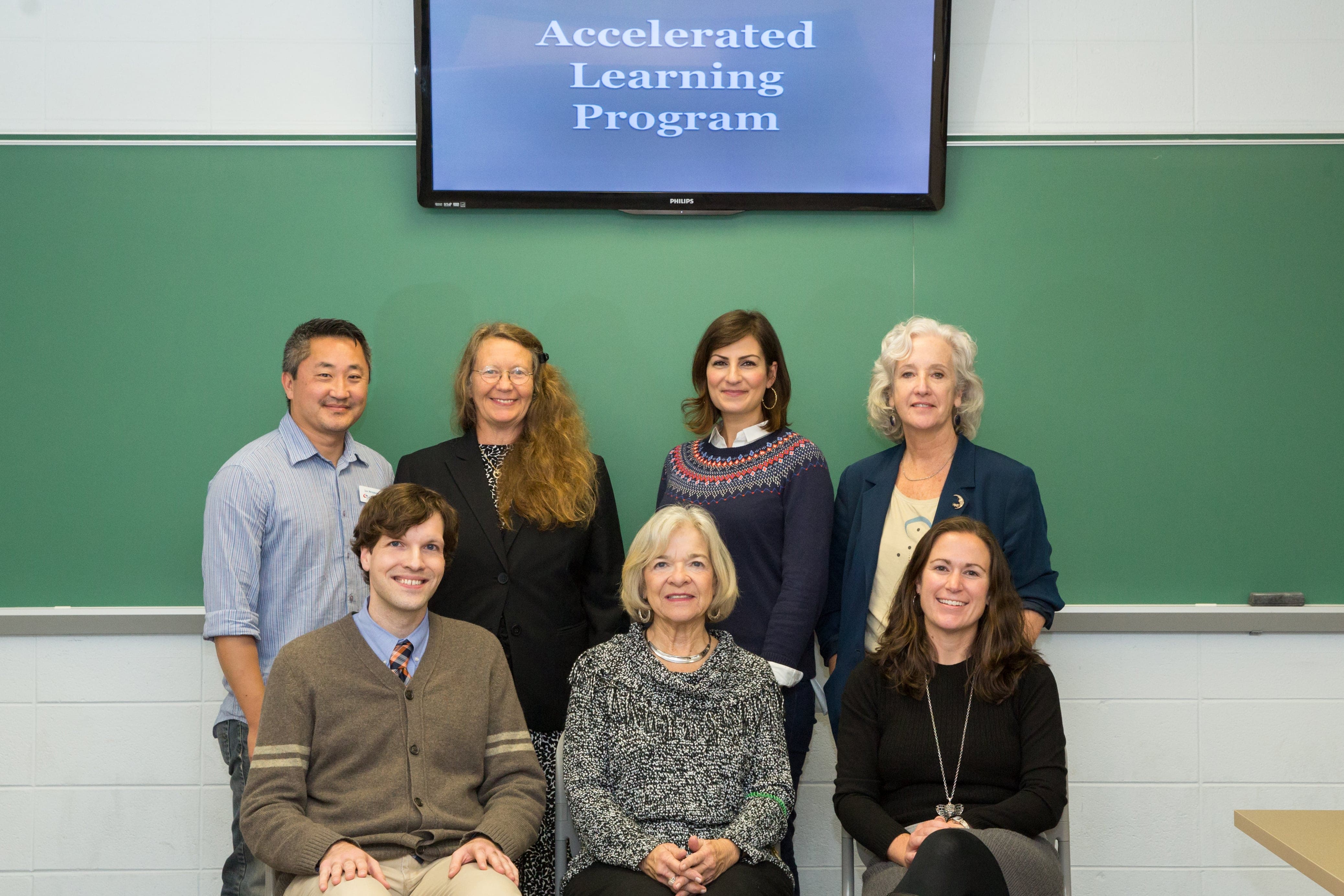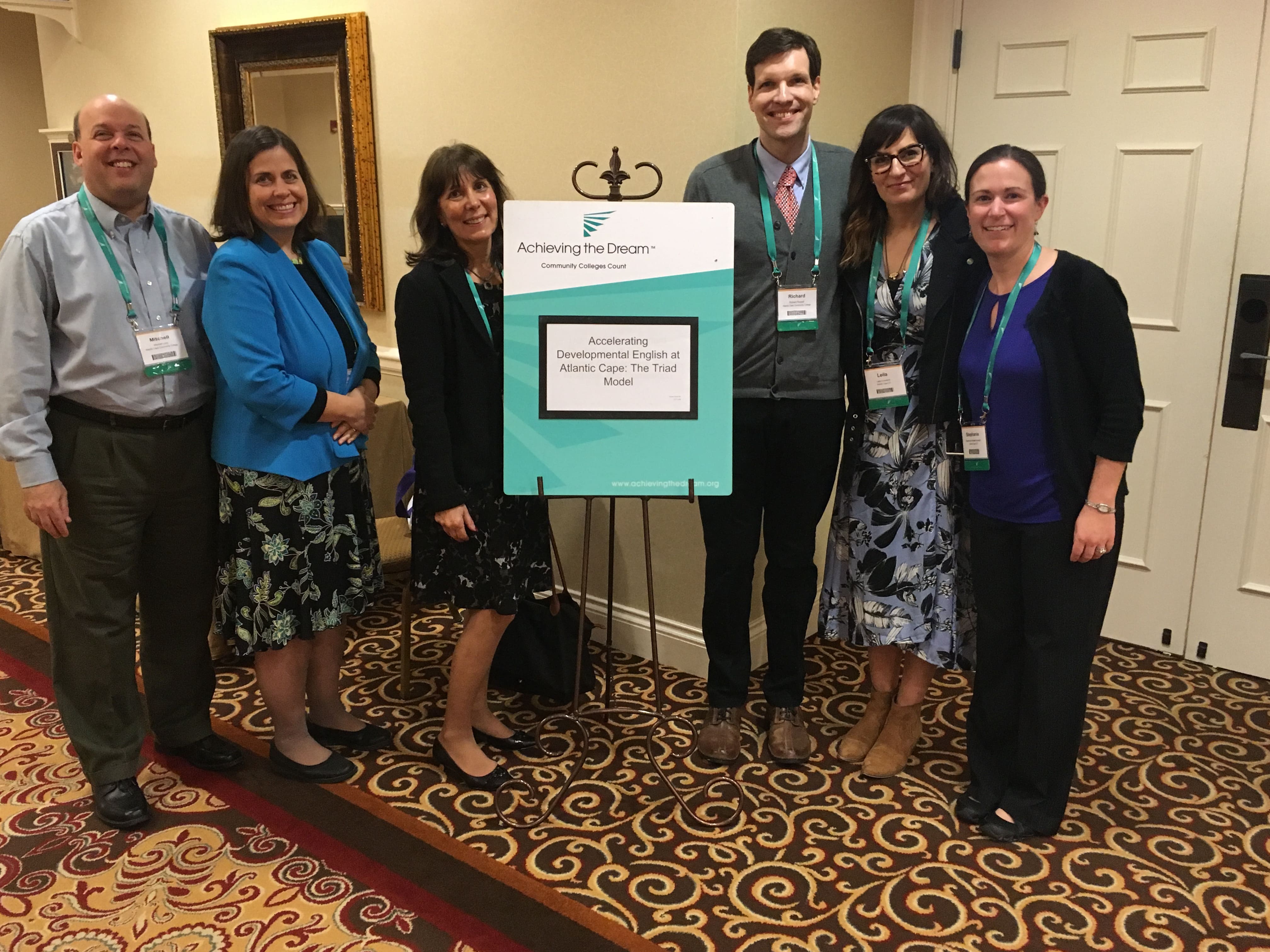
Accelerated Learning Program
The Accelerated Learning Program (ALP) is for full- or part-time students who place into ENGL080 Reading/Writing II and would like to accelerate their progress by taking ENGL101 Composition I and ENGL099 Accelerated Learning Program Support. Sections of ALP are available at all three campuses. Both day and evening sections are available. To register for ALP, see an academic advisor.
What is ALP?
The Accelerated Learning Program is focused on students who place into ENGL080 Reading/Writing II and is intended to both accelerate their progress and improve their success by mainstreaming them into an ENGL101 Composition I class when they also take the ALP support course, ENGL099. A student who elects to participate in the ALP program is placed into a designated section of ENGL101, which is composed of 9 ALP students and 11 students who placed into ENGL101. The 9 ALP students from two of these ALP ENGL101 sections are combined into one ENGL099 support class. All three courses (the two sections of ENGL101 and the ENGL099 section) are taught by the same instructor and are three credits. These units of three classes are called triads. Once a week, the ALP course meets in a computer lab.
A visual representation of a triad:
|
|
|
|
The green students are the ALP students, and the blue students are those who placed into ENGL101.
In ALP, the support course guides students while they are taking college-level English rather than being a prerequisite for the course as ENGL080 is. To do this, ALP courses use backward design, taking the goal of the course and incorporating the scaffolding students need to reach it. Here are some examples of what happens in an ALP class:
- Scaffolding for the 101 assignments: brainstorming and other pre-writing, writing workshops, draft reviews, focused revising and editing activities, etc.
- Opportunities to practice and refine reading skills, including close and active reading.
- Opportunities to practice and refine writing skills such as organization, development, editing, etc.
- An introduction to the Atlantic Cape campus, services, policies, and procedures.
- Answering student questions about the 101 class or the school generally.
- Addressing non-cognitive issues and promoting the habits of successful students.
For more information contact
Associate Professor of English
What are the benefits of ALP for students?
- ALP students save time: The support course runs concurrently with Composition I, so the students do not need to take a developmental semester before entering college-level work.
- ALP students save money: The developmental course and required College Skills co-requisite course are integrated into a single course. ALP uses the 101 course materials and campus resources as the course materials; there are no additional textbooks for students to buy.
- ALP students can take program courses in their first semester: Students in the developmental course may only choose from a limited number of courses until the developmental course is completed.
- ALP students are challenged by college-level work but receive extra support in the ALP course.
- ALP students receive extra time and individual instruction from their Composition I professor: The same professor teaches both Composition I and ALP, enhancing the instruction in ALP.
- ALP students witness the benefits of the support course: Remediation takes place within the context of the college-level course, rather than prior to it.
ALP students are more likely to be successful. Student success data has proven that ALP students are more likely than students taking the traditional developmental sequence to
- pass Composition I,
- pass Composition II,
- and return the semester following ALP
What are students saying about ALP?
Comments from past ALP students:
"ALP greatly helped my confidence in 101. At the beginning, I didn't know or thought I didn't know anything about reading and writing…ALP is awesome for becoming part of the Atlantic Cape family and meeting students at similar levels…Best class ever."
"I felt more like a student at Atlantic Cape because I learned so much about not only English as a course but this college as a whole."
"I always felt like I was one step ahead of all the other kids in English 101 because of the extra work with the same professor."
How did ALP begin at Atlantic Cape?
Atlantic Cape's program began when English full-time faculty member Effie Russell learned about the Community College of Baltimore County's (CCBC) Accelerated Learning Program. Information about the CCBC model can be found at their website. CCBC hosts the Conference on Acceleration in Developmental Education every June. Information on this conference can be found under Conferences on their website.
Effie Russell adapted the CCBC model for Atlantic Cape by developing the triad model, where nine students from each of two Composition I courses populate a single Accelerated Learning Program class of eighteen students. She piloted the program in Spring 2012, and the positive results of the pilot led Atlantic Cape to begin scaling up: growing the program to include all three campuses, opening the program to more students such as part-time students, and training more faculty.
Who are the ALP faculty?
 Photo credit - Jay Peterson
Photo credit - Jay Peterson
|
Name |
Role |
|
Phone |
Primary Campus |
|---|---|---|---|---|
|
Leila Crawford |
Full-time Faculty |
X5036 |
Mays Landing |
|
|
Ron McArthur |
Full-time Faculty |
X5007 |
Mays Landing |
|
|
Maryann McCall |
Full-time Faculty |
X4987 |
Mays Landing |
|
|
Vickie Melograno |
Full-time Faculty |
X3553 |
Cape May |
|
|
Stephanie Natale-Boianelli |
Full-time Faculty |
X4963 |
Mays Landing |
|
|
Jay Peterson |
Full-time Faculty |
X5649 |
Mays Landing/ Atlantic City |
|
|
Effie Russell |
Full-time Faculty |
X4955 |
Mays Landing |
|
|
Richard Russell |
Full-time Faculty |
X4971 |
Mays Landing/ Atlantic City |
|
|
Daymis Alicea |
Academic Advisor |
X5081 |
Mays Landing |
ALP News and Events:
February 23, 2018: National Association for Developmental Education Conference.

Effie Russell, Professor of English, presented on Accelerated Learning: Three Models for Student Success at the National Association for Developmental Education conference in National Harbor, Maryland on February 23, 2018.The presentation discussed the advantages and challenges of three different models of acceleration: the co-requisite model, the triad model and a model that places all ALP students together in a 101 course that offers more time and support. Attendees were encouraged to share their own ALP models’ challenges and rewards.
February 21, 2018: 2018 DREAM Conference.
Stephanie Natale-Boianellli, Richard Russell, and Leila Crawford made a presentation on Accelerated Learning Program (ALP) at the 2018 DREAM Conference in Nashville, Tennessee on February 21, 2018. They presented Atlantic Cape’s story of adapting the ALP program and gave an overview of the triad model of acceleration as a springboard for discussion of ALP models and best practices in adapting a program. They also shared activities and assignments particularly suited to overcoming the challenges of the larger ALP class size through a focus on community building and mentoring. Dean of Liberal Studies Dr. Denise Coulter, who attended the workshop, commented that "the ALP presentation had nice attendance. The team provided a comprehensive picture of their process and reviewed data to illustrate the positive impact of their program. The audience asked plenty of questions, which the presenters handled with great aplomb".
June 13, 2017: Second Annual ALP Summer Institute

August 3, 2016: ALP Summer Institute Highlights Best Practices for Educators.

August 1, 2016: Atlantic Cape Community College is named a 2016 Achieving the Dream Leader College. The Accelerated Learning Program is highlighted in the college's profile. Read more in the Atlantic Cape Communicator.
April 9, 2016: Atlantic Cape Community College's Accelerated Learning Program is awarded the 2016 Diana Hacker/Two-Year College English Association (TYCA) Outstanding Programs in English Award. Professors Effie Russell, Richard Russell, and Stephanie Natale-Boianelli traveled to the Two-Year College English Association Breakfast at the Conference on College Composition and Communication in Houston, TX.

December 11, 2015: Professors Maryann Flemming-McCall, Richard Russell and Stephanie Natale-Boianelli presented on Atlantic Cape's Accelerated Learning Program (ALP) at the NJ Developmental Education Summit, Dec. 11, at Middlesex County College. The event was hosted by the New Jersey Council of County College's Center for Student Success.

November 18, 2015: Professor Julianne Reinhardt took some of her ALP and ENGL101 students to Stockton University to hear Patrick J. Kennedy discuss his new book, A Common Struggle , which he co-authored with Stephen Fried, and his bold agenda for changing the way we view and treat mental health and addiction in America.





